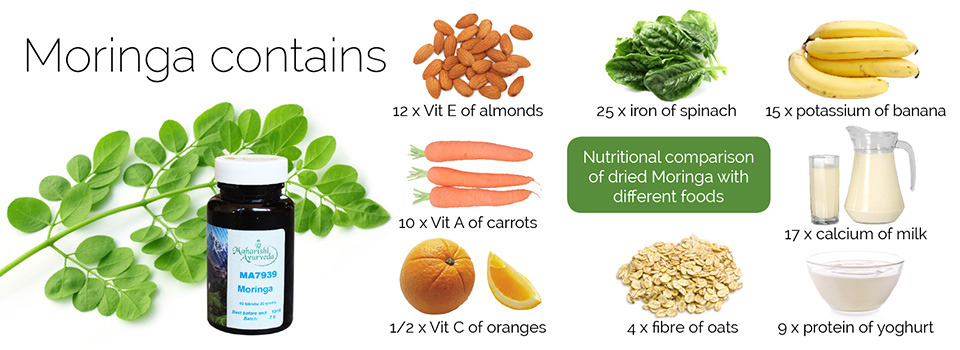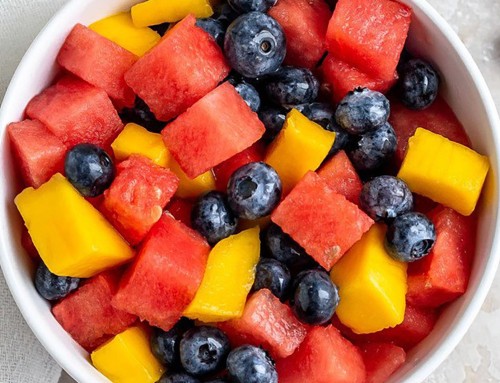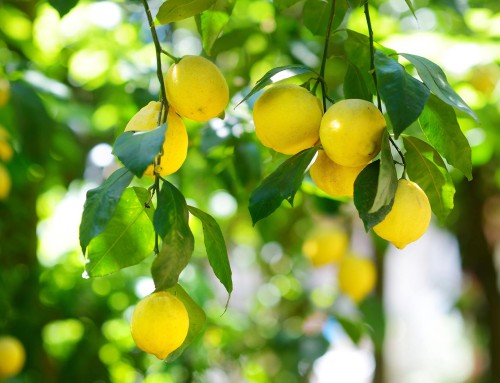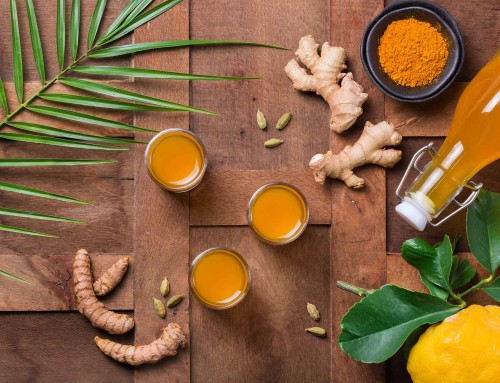I was recently asked to create the above diagram to promote Moringa for Maharishi AyurVeda Products and have to admit that I had never previously heard of this herb.
I did a Google search and was amazed, not only by the huge number and range of benefits it is supposed to have – from increasing mental clarity, to normalising blood pressure, to weight management, to improving libido – but also by the number of nutrients it contains. This research inspired me to immediately stock up with a supply of Moringa.
Why bother with supplements?
To tell you the truth, I have never been a big fan of the vitamin or mineral supplements found in health food stores. I’ve tended to go by the philosophy that we should be getting our nutrients from ‘real food’.
Our body has evolved to recognise food as the source of the nutritive building blocks we need to stay strong and healthy. So when a piece of food appears in our stomach our Agni (digestive fire) immediately goes about its work of extracting the nutrients, such as vitamin, minerals, proteins and essential fatty acids, and supplied them to our tissues and cells.
One of the reasons behind the supplement industry is that some people are unable to absorb the right quantity of specific nutrients and this can result in poor health. For example, because most of us spend most of our time indoors, we can become deficient in Vitamin D, which our body manufactures when it is exposed to sunlight.
Another reason for taking supplements is that our basic food ingredients now have far less nutrient power than at any time in history.
Apples have lost 80% of their vitamin C
The other day I read a worrying article about the increasing lack of nutrition in our many of our foods. The article by Courtney White, author of Grass, Soil and Hope, quoted Australian soil scientist Christine Jones as saying that in Australia today it is possible to buy an orange that contains no vitamin C whatever and that, between 1948 and 1991, vitamin A content of carrots had dropped by 99% and apples lost 80% of their vitamin C.
She went on to say that, between 1940 and 1990, UK research had show that mineral content in nearly all vegetables had dropped significantly:
- Copper had been reduced by 76%
- Calcium by 46%
- Iron by 27%,
- Magnesium by 24%
- Potassium by 16%.
Over the same period the mineral content of meat in the UK had also dropped significantly:
- Iron by 54%,
- Copper by 24%
- Calcium by 41%.
To stay strong and healthy we need a constant supply of vitamins and minerals. We need iron to produce red blood cells, to transport oxygen to our cells, to convert blood sugar into energy, and for the efficient functioning of our muscles. Copper help maintain our organs and immune system, and helps neutralise damaging “free radicals” in our blood. Calcium is essential for our bone health. Magnesium is needed in every single cell to help their proper function.
Food is our best source of vitamins and minerals
The trouble with many vitamin and mineral supplements is that they are not recognised by our body as food. The result can be that a large percentage of such supplements are not taken up by our body tissues and – forgive me for being indelicate – end up being flushed down the toilet. They may even result in harm.
Take calcium as an example. Calcium is one of the most popular dietary supplements, and many people believe that taking calcium pills is a good way to prevent bone fractures that may result from osteoporosis.
However, recent finding show that while organically-bound calcium, that is present in food, is properly absorbed and beneficial, the elemental calcium found in most supplements may dramatically increase the risk of heart attack and other health problems.
Moringa – a whole food supplement
Which brings us back to Moringa. The nice thing about Maharishi AyurVeda Moringa (MA7939) is that it consists of the dried and powdered leaf of the Moringa plant. You could accurately call it a whole food supplement, in that your body will recognise it as food and its many nutrients will be bio-available and easily absorbed.
The Miracle Tree
Although now grown in many parts of the world, the original home of Moringa is in the Himalayas, the famed source of many medicinal plants.
Traditionally the Moringa tree is referred to as “The Miracle Tree” and “Mother’s Best Friend” and since Moringa contains a unique combination of vitamins, minerals and amino acids that make it one of the most nutritious plants ever discovered, these terms are apt.
 Moringa leaves contain:
Moringa leaves contain:
- 25 times the iron of spinach
- 17 times the calcium of milk
- 10 times the vitamin A of carrots
- 15 times the potassium of bananas
- every essential amino acid your body needs.
- protein
- vitamin A, B and C
- 14 vital minerals.
The leaves are rich in:
Antioxidants
Moringa contains 46 powerful antioxidants – compounds that protect the body against the destructive effects of free radicals by neutralizing them before they can cause cellular damage and disease.
Vitamins
Vitamin A (Alpha & Beta-Carotene), Vitamin B (B1, B2, B3, B5, B6, B12), Vitamin C, Vitamin D, Vitamin E, Vitamin K, Folate (Folic Acid), Biotin.
Minerals
Calcium, Chromium, Copper, Fluorine, Iron, Manganese, Magnesium, Molybdenum, Phosphorus, Potassium, Sodium, Selenium, Sulphur, Zinc.
Essential Amino acids
Isoleucine, Leucine, Lysine, Methionine, Phenylalanine, Threonine, Tryptophan, Valine.
Non-essential Amino Acids
Alanine, Arginine, Aspartic Acid, Cystine, Glutamine, Glycine, Histidine, Proline, Serine, Tyrosine.






